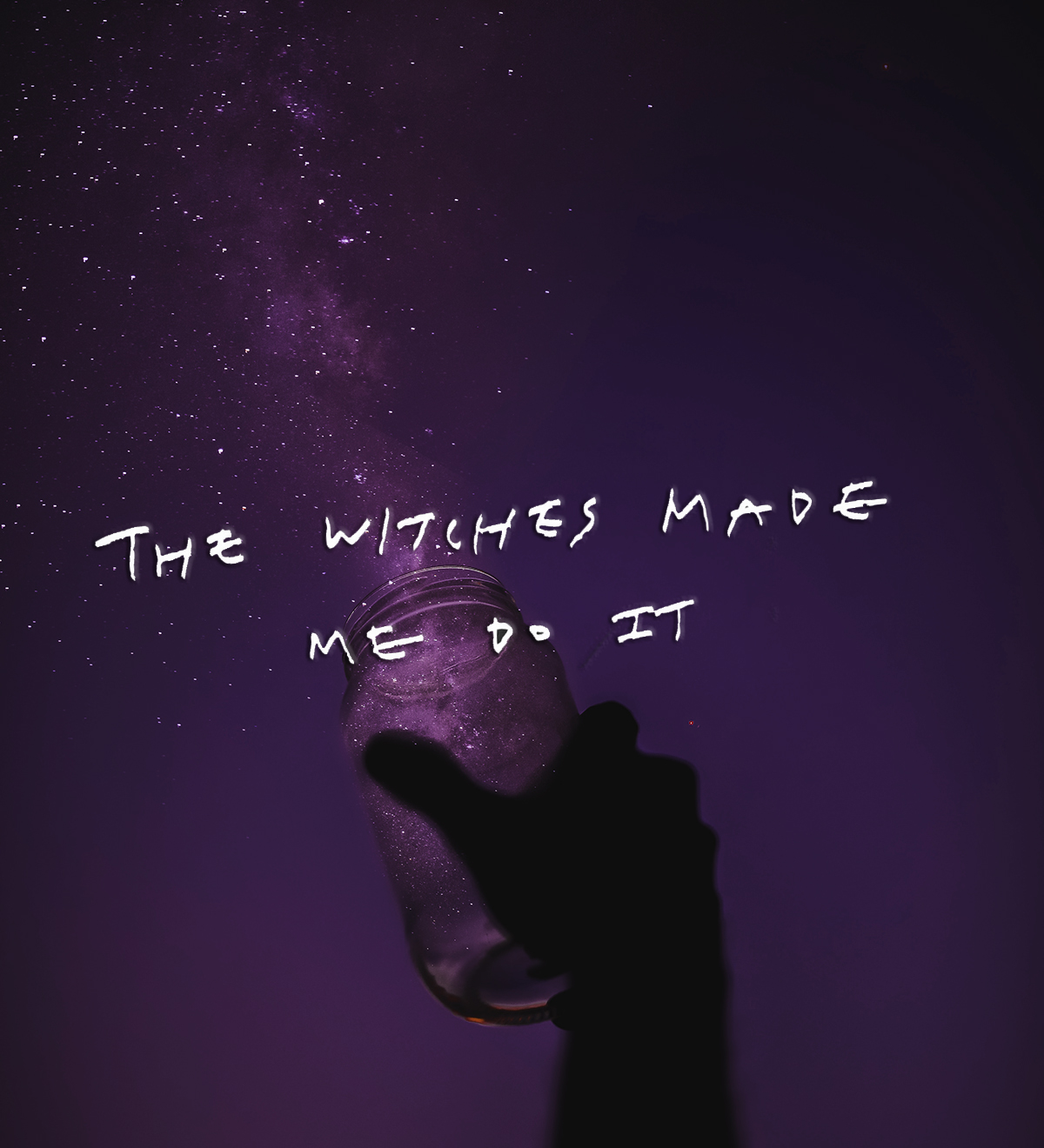
lyrics by ryan cassata
font by emiko lytell

ryan cassata
font by emiko lytell
A tumble from heaven, landmines, bones, synthetic ears, a car horn’s long howl, Maryland’s pink breath in a mirror—this month we are looking at machines; the interplay between organic experiences within sterile spaces.
We are also launching the artists TALK project, featuring interviews with groundbreaking and emerging voices within the LGBTQIA community.
You can read my conversation with Sylvia here.
You can read Liam Lezra’s interview with Ryan Cassata here.
And next month, we are looking at:

LOVE. We want sweet messy brutal musings on the depths and peaks of first loves, last loves, almost loves, should-have-never loves…
You can submit here.
amanda lezra
Editor-in-Chief
Through the Bus Window, 1998
With palms like leather soles, he shuffles toward our bus, planting his hands on the ground and sliding his bottom forward, a swift, swinging rhythm, the sleeves of his shirt and seat of his pants sullied with earth. What core strength, I think, guessing his age as mid-forties.
I do the math, surmising he was in his teens when it happened. But I don’t know. I don’t know if it was a landmine, a bomb, or gangrene from wounds, only that his legs were taken. I don’t know on which side of the war he stood, only that both sides spoke of bringing freedom. I don’t know why he rushed to our bus, only that I suspect he hopes for money. The bus crawls away, crunching gravel under its weight, at this intersection north of Saigon. I don’t know what he thinks as we gaze through the glass, only that our eyes look into the other.
He waves, wearing a sign around his neck that says Jesus Saves. I don’t know what salvation is, only that forgiveness is a myth based on the spilling of blood. Life teaches me that the stains cannot be washed away, that it is best to grieve our sins and not deceive ourselves, that if there is no pardon, perhaps we tread more gently on the earth.
George Such is a part-time lecturer in the Writing Program at Rutgers University and also works as an independent personal fitness trainer. In a previous incarnation he was a chiropractor for twenty-seven years in Washington State. His creative writing has appeared in Arroyo Literary Review, Blue Mesa Review, The Cape Rock, Dislocate, The Evansville Review, and many other literary journals.
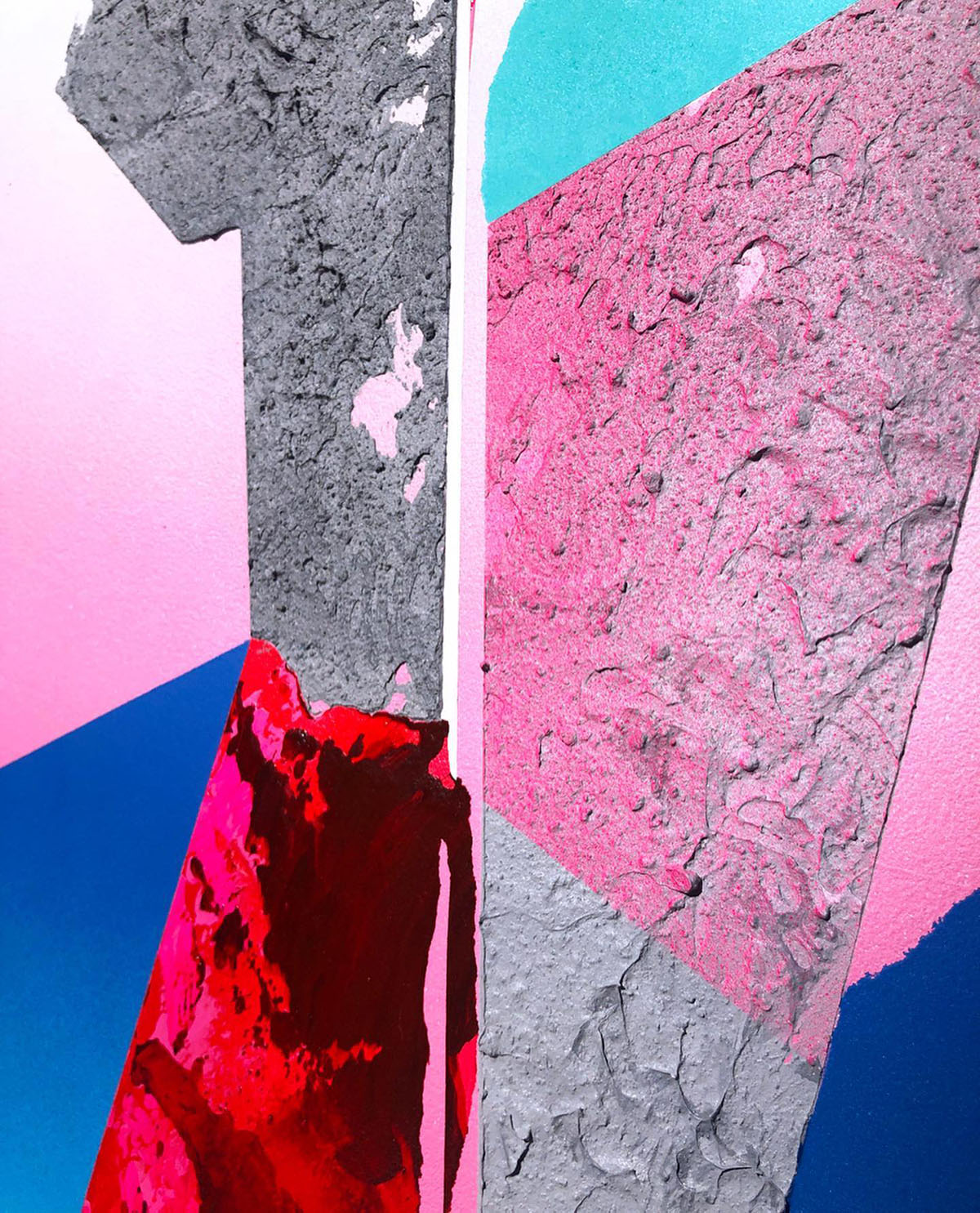
inhabited
A tumble from heaven, landmines, bones, synthetic ears, a car horn’s long howl, Maryland’s pink breath in a mirror—this month we are looking at machines; the interplay between organic experiences within sterile spaces.
We are also launching the artists TALK project, featuring interviews with groundbreaking and emerging voices within the LGBTQIA community.
You can read my conversation with Sylvia here.
You can read Liam Lezra’s interview with Ryan Cassata here.
And next month, we are looking at:

We want sweet messy brutal musings on the depths and peaks of love: first loves, last loves, almost loves, should-have-never loves.
love,
amanda lezra
Editor-in-Chief
Through the Bus Window, 1998
With palms like leather soles, he shuffles toward our bus, planting his hands on the ground and sliding his bottom forward, a swift, swinging rhythm, the sleeves of his shirt and seat of his pants sullied with earth. What core strength, I think, guessing his age as mid-forties.
I do the math, surmising he was in his teens when it happened. But I don’t know. I don’t know if it was a landmine, a bomb, or gangrene from wounds, only that his legs were taken. I don’t know on which side of the war he stood, only that both sides spoke of bringing freedom. I don’t know why he rushed to our bus, only that I suspect he hopes for money. The bus crawls away, crunching gravel under its weight, at this intersection north of Saigon. I don’t know what he thinks as we gaze through the glass, only that our eyes look into the other.
He waves, wearing a sign around his neck that says Jesus Saves. I don’t know what salvation is, only that forgiveness is a myth based on the spilling of blood. Life teaches me that the stains cannot be washed away, that it is best to grieve our sins and not deceive ourselves, that if there is no pardon, perhaps we tread more gently on the earth.
George Such is a part-time lecturer in the Writing Program at Rutgers University and also works as an independent personal fitness trainer. In a previous incarnation he was a chiropractor for twenty-seven years in Washington State. His creative writing has appeared in Arroyo Literary Review, Blue Mesa Review, The Cape Rock, Dislocate, The Evansville Review, and many other literary journals.

inhabited
The Boy on the Crates
In the alley behind the mosque,
he climbed a stack of milk crates
because he wanted to see
the forest behind the wall, the nest
of the tortured bulbul, the chocking
clocktower surrounded by cornhusks,
and the militiamen who slept
with machineguns as their malign
mistresses. The coffee-colored
prostitute pulled the curtains
because the boy on the crates used her
bedroom like his personal cinema.
He cried when he witnessed a bullet
strike a beggar by the bridge. The boy
cursed the snipper on the clocktower.
In a dream, the stack of crates toppled,
and the stoic God fell from the sky
into the arms of the prostitute.
Shahé Mankerian is the principal of St. Gregory Hovsepian School and the poetry co-director of Rockvale Review. His manuscript, History of Forgetfulness, has been a finalist at the Bibby First Book Competition, the Crab Orchard Poetry Open Competition, the Quercus Review Press Poetry Book Award, and the White Pine Press Prize. Online publications, Border Crossing and Cahoodaloodaling, have nominated Shahé’s poems for the 2018 Best of the Net. Visible Poetry Project’s animation of Mankerian’s poem, “The Last Mosque,” premiered at the 2018 New York Poetry Festival. He received the 2017 Editors’ Prize from MARY: A Journal of New Writing.
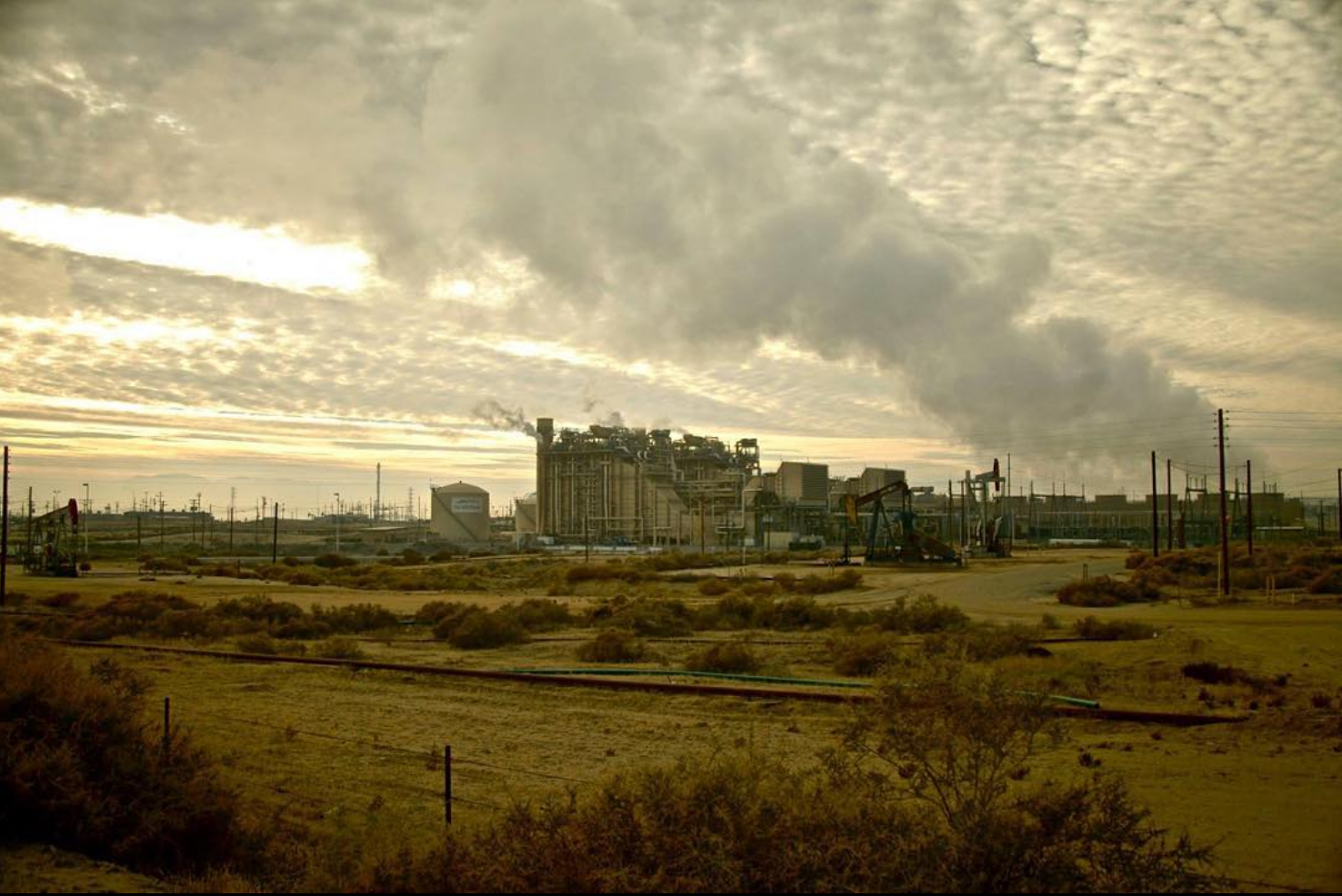
The Boy on the Crates
In the alley behind the mosque,
he climbed a stack of milk crates
because he wanted to see
the forest behind the wall, the nest
of the tortured bulbul, the chocking
clocktower surrounded by cornhusks,
and the militiamen who slept
with machineguns as their malign
mistresses. The coffee-colored
prostitute pulled the curtains
because the boy on the crates used her
bedroom like his personal cinema.
He cried when he witnessed a bullet
strike a beggar by the bridge. The boy
cursed the snipper on the clocktower.
In a dream, the stack of crates toppled,
and the stoic God fell from the sky
into the arms of the prostitute.
Shahé Mankerian is the principal of St. Gregory Hovsepian School and the poetry co-director of Rockvale Review. His manuscript, History of Forgetfulness, has been a finalist at the Bibby First Book Competition, the Crab Orchard Poetry Open Competition, the Quercus Review Press Poetry Book Award, and the White Pine Press Prize. Online publications, Border Crossing and Cahoodaloodaling, have nominated Shahé’s poems for the 2018 Best of the Net. Visible Poetry Project’s animation of Mankerian’s poem, “The Last Mosque,” premiered at the 2018 New York Poetry Festival. He received the 2017 Editors’ Prize from MARY: A Journal of New Writing.

White Terminal
The face of his wife who lies beneath a frost-
rimmed pane of clear glass reminds him of the
technician responsible for reattaching his leg
after the incident. She did not ask him about
the past, for she had scanned his cyber-brain.
He has never confessed to his wife that he is
a machine, but in watching over her through
her thousand-year sleep, he wonders how he
might explain the moon’s absence or the red
haze that rises over the plains in the starlight.
The bones of the leviathans contain nutrient-
rich marrow upon which, in theory, a person
may subsist indefinitely, more than a lifetime
if need be. The robot can still see the ghostly
hulks engaged in combat around the fissures.
Spirits have been known to lead human men
astray with promises of paradise or warnings
of hell, but synthetic ears hear just what they
were made to, such as a microscopic rupture
in the tubes that circulate the liquid coolants.
The earthquakes have increased in frequency
and destructive force in recent years, and the
exchange of sensible data with nine outposts
has ceased entirely. Intercepted audio signals
contain only a crackle that might be laughter.
Gregory Kimbrell is the author of The Ceremonial Armor of the Impostor (Weasel Press, 2019) and The Primitive Observatory (Southern Illinois University Press, 2016), winner of the 2014 Crab Orchard Series in Poetry First Book Award. His poems have appeared or are forthcoming in Across the Margin, Alcyone, Coffin Bell, The Dark Sire, Deluge, Door is a Jar, The Operating System, and elsewhere. More of his writing, including his sci-fi/horror magnetic poems and erasures, can be found at gregorykimbrell.com.
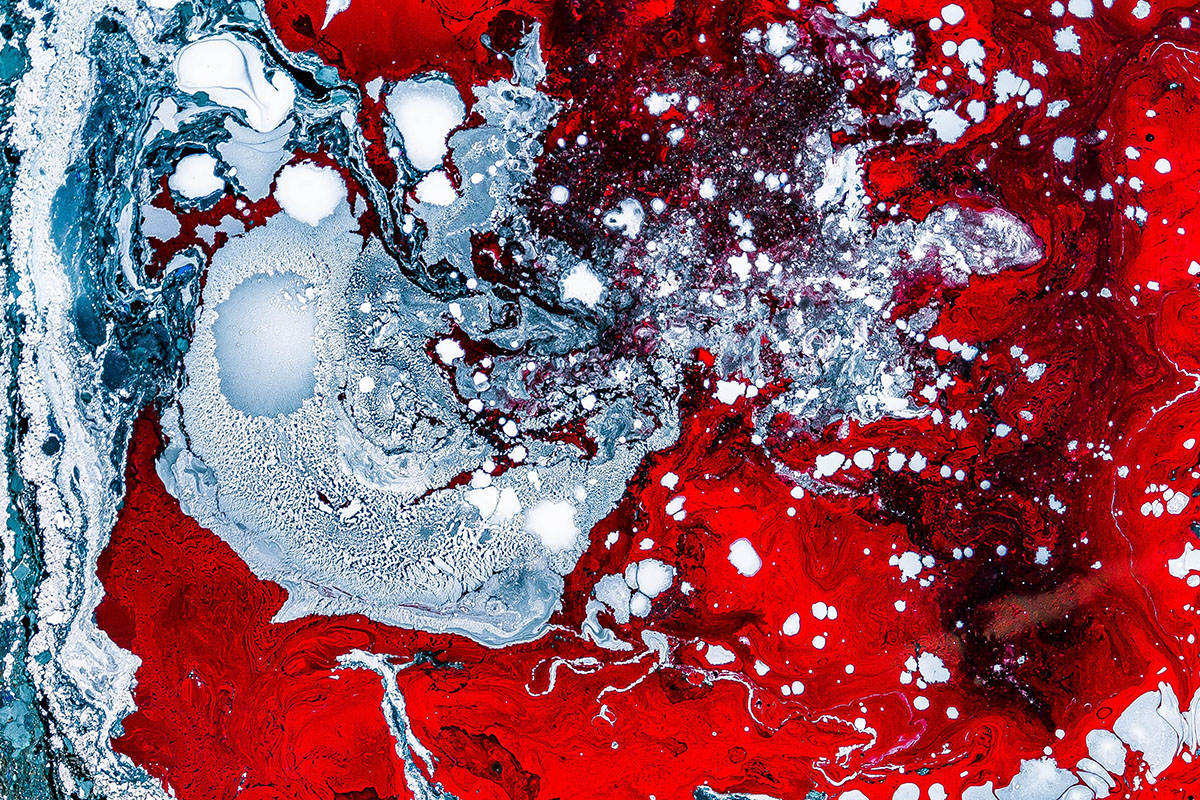
cristina gottardi
White Terminal
The face of his wife who lies beneath a frost-
rimmed pane of clear glass reminds him of the
technician responsible for reattaching his leg
after the incident. She did not ask him about
the past, for she had scanned his cyber-brain.
He has never confessed to his wife that he is
a machine, but in watching over her through
her thousand-year sleep, he wonders how he
might explain the moon’s absence or the red
haze that rises over the plains in the starlight.
The bones of the leviathans contain nutrient-
rich marrow upon which, in theory, a person
may subsist indefinitely, more than a lifetime
if need be. The robot can still see the ghostly
hulks engaged in combat around the fissures.
Spirits have been known to lead human men
astray with promises of paradise or warnings
of hell, but synthetic ears hear just what they
were made to, such as a microscopic rupture
in the tubes that circulate the liquid coolants.
The earthquakes have increased in frequency
and destructive force in recent years, and the
exchange of sensible data with nine outposts
has ceased entirely. Intercepted audio signals
contain only a crackle that might be laughter.
Gregory Kimbrell is the author of The Ceremonial Armor of the Impostor (Weasel Press, 2019) and The Primitive Observatory (Southern Illinois University Press, 2016), winner of the 2014 Crab Orchard Series in Poetry First Book Award. His poems have appeared or are forthcoming in Across the Margin, Alcyone, Coffin Bell, The Dark Sire, Deluge, Door is a Jar, The Operating System, and elsewhere. More of his writing, including his sci-fi/horror magnetic poems and erasures, can be found at gregorykimbrell.com.

cristina gottardi
Why the Car Horn is a Perfect Metaphor for Capitalism
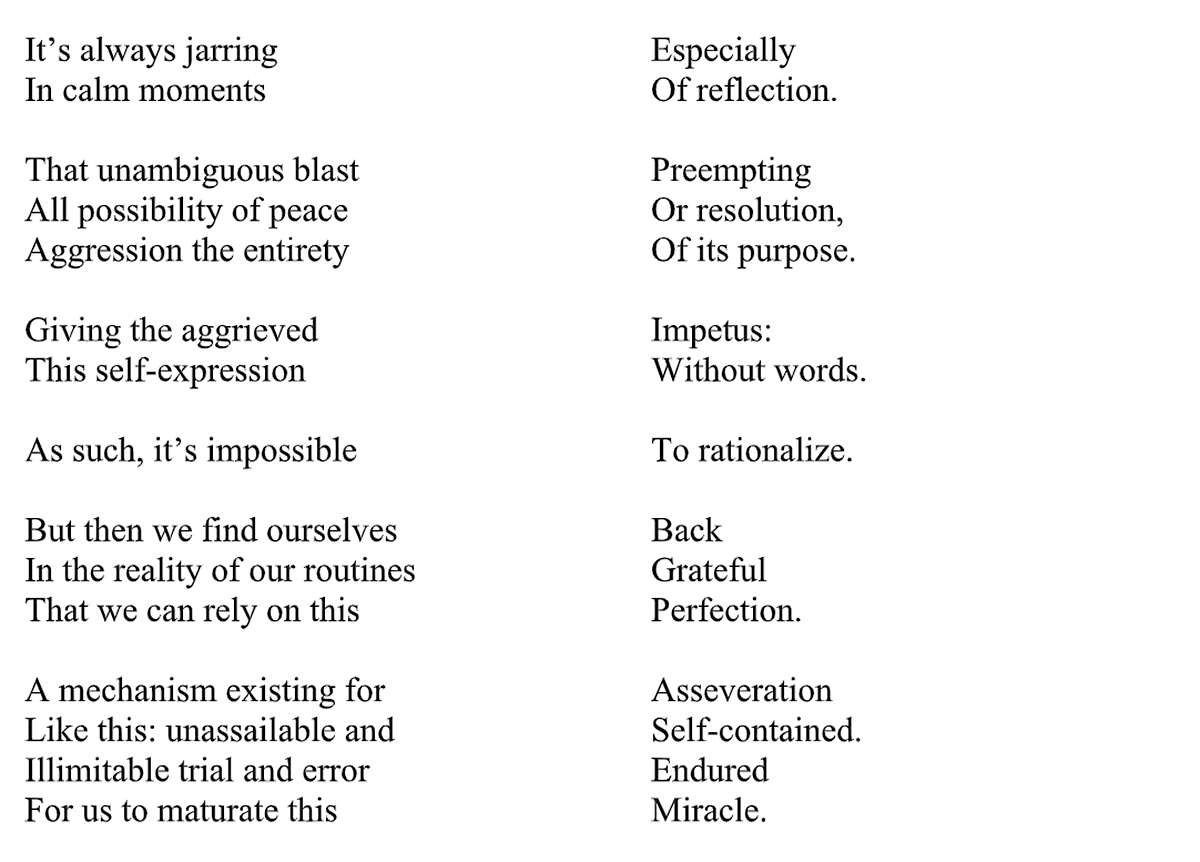
Sean Murphy has appeared on NPR’s “All Things Considered” and been quoted in USA Today, The New York Times, The Huffington Post, and AdAge. His work has also appeared in Salon, The Village Voice, The New York Post, The Good Men Project, Memoir Magazine, and others. He has twice been nominated for the Pushcart Prize, and served as writer-in-residence of the Noepe Center at Martha’s Vineyard. He’s Founding Director of 1455 (www.1455litarts.org). To learn more, please visit seanmurphy.net/ and @bullmurph.

Why the Car Horn is a Perfect Metaphor for Capitalism

Sean Murphy has appeared on NPR’s “All Things Considered” and been quoted in USA Today, The New York Times, The Huffington Post, and AdAge. His work has also appeared in Salon, The Village Voice, The New York Post, The Good Men Project, Memoir Magazine, and others. He has twice been nominated for the Pushcart Prize, and served as writer-in-residence of the Noepe Center at Martha’s Vineyard. He’s Founding Director of 1455 (www.1455litarts.org). To learn more, please visit seanmurphy.net/ and @bullmurph.

Frederick Maryland, Pride Poem
I came during the sunset,
And left during the sunrise.
My morning meditation was a limo ride from Maryland to Virginia,
Silent aside from the sound of rolling wheels,
And my driver’s raspy cough,
Where the scenery looks like a postcard
a pink sky that slowly fades to blue as it touches heaven,
green green grass that never heard the word drought
spaced out, white-painted manors and farmhouses
a post office that is the size of my apartments’ living room
a baby deer learning to walk alongside her strong mother
we cross the bridge into Virginia to see “My Wits End” antique shop that looks like it’s really on its last straw,
at its wits end,
like every shopper holds their breath while they’re inside exploring through trinkets and treasures of silver and gold,
in fear that the roof may cave
signs for corn on the cob and freshly baked pies
smoke billowing from chimneys
we roll on as I wave goodbye to the last city I poured my heart out in,
another dream come true,
another rock n’ roll fantasy,
that ends too soon
Ryan Cassata is an internationally recognized motivational speaker and singer/songwriter. He was the first openly trans performer at the Vans Warped Tour; he’s performed at Jazz at Lincoln Center, The Oregon Shakespeare Festival’s Green Show, the South by Southwest Film Festival, and the world’s biggest pride festivals. He has appeared on The Tyra Banks Show, ABC’s Head’s Up, The Larry King Show, and in 600 performances touring across the United States and internationally. His award-winning music video, “Daughter,” which has been viewed over 760,000 times. He has been featured in GRAMMY.com, Rolling Stone, Billboard, The New York Times, Paper Magazine, The Advocate, Buzzfeed, and The NY Daily News. You can learn more about him and listen to his music at ryancassata.com.

Frederick Maryland, Pride Poem
I came during the sunset,
And left during the sunrise.
My morning meditation was a limo ride from Maryland to Virginia,
Silent aside from the sound of rolling wheels,
And my driver’s raspy cough,
Where the scenery looks like a postcard
a pink sky that slowly fades to blue as it touches heaven,
green green grass that never heard the word drought
spaced out, white-painted manors and farmhouses
a post office that is the size of my apartments’ living room
a baby deer learning to walk alongside her strong mother
we cross the bridge into Virginia to see “My Wits End” antique shop that looks like it’s really on its last straw,
at its wits end,
like every shopper holds their breath while they’re inside exploring through trinkets and treasures of silver and gold,
in fear that the roof may cave
signs for corn on the cob and freshly baked pies
smoke billowing from chimneys
we roll on as I wave goodbye to the last city I poured my heart out in,
another dream come true,
another rock n’ roll fantasy,
that ends too soon
Ryan Cassata is an internationally recognized motivational speaker and singer/songwriter. He was the first openly trans performer at the Vans Warped Tour; he’s performed at Jazz at Lincoln Center, The Oregon Shakespeare Festival’s Green Show, the South by Southwest Film Festival, and the world’s biggest pride festivals. He has appeared on The Tyra Banks Show, ABC’s Head’s Up, The Larry King Show, and in 600 performances touring across the United States and internationally. His award-winning music video, “Daughter,” which has been viewed over 760,000 times. He has been featured in GRAMMY.com, Rolling Stone, Billboard, The New York Times, Paper Magazine, The Advocate, Buzzfeed, and The NY Daily News. You can learn more about him and listen to his music at ryancassata.com.

Sign up to receive a new issue of Rough Cut Press the first week of each month.
We will never share your contact information without explicit permission.

